 Petzlover
Petzlover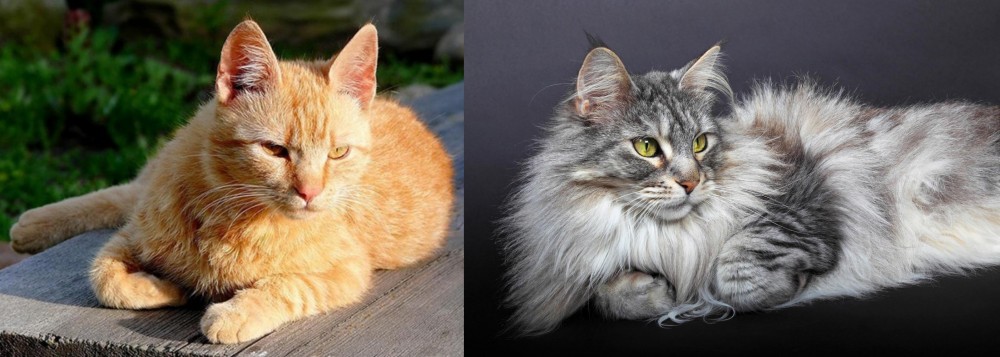 Brazilian Shorthair is originated from Brazil but Domestic Longhaired Cat is originated from United States. Both Brazilian Shorthair and Domestic Longhaired Cat are having almost same weight. Both Brazilian Shorthair and Domestic Longhaired Cat has same life span. Both Brazilian Shorthair and Domestic Longhaired Cat has same litter size. Brazilian Shorthair requires Low Maintenance. But Domestic Longhaired Cat requires Moderate Maintenance
Brazilian Shorthair is originated from Brazil but Domestic Longhaired Cat is originated from United States. Both Brazilian Shorthair and Domestic Longhaired Cat are having almost same weight. Both Brazilian Shorthair and Domestic Longhaired Cat has same life span. Both Brazilian Shorthair and Domestic Longhaired Cat has same litter size. Brazilian Shorthair requires Low Maintenance. But Domestic Longhaired Cat requires Moderate Maintenance
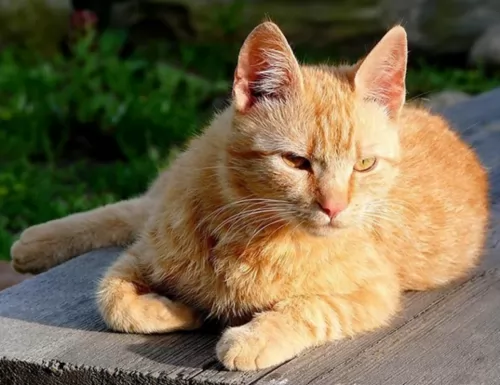 This attractive purebred cat is the first cat from Brazil to get international recognition.
This attractive purebred cat is the first cat from Brazil to get international recognition.
It is amazing that this cat goes back to the streets of Brazil as a feral cat. Centuries ago, when the Portuguese arrived in Brazil, they brought cats with them.
It was in the 1980s that a Brazilian cat breeder wanted to transform certain street cats into purebred cats and the Brazilian Shorthair emerged from these efforts. In 1998, the World Cat Federation gave the cat ‘approval breed’ status.
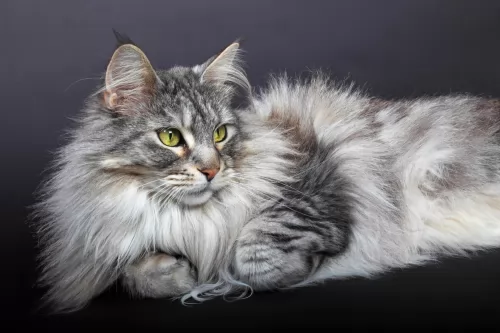 The Domestic Longhaired cat came about because of various attempts by breeders to bring in certain Persian cat varieties in the American Shorthairs.
The Domestic Longhaired cat came about because of various attempts by breeders to bring in certain Persian cat varieties in the American Shorthairs.
The cat comes from champion bloodlines but one of the most remarkable traits of the Domestic Longhair cat is that they are just typical cats with long hair. In other words, Domestic Longhairs are a product of various cat breedings and it is thought they arrived in the USA with the early settlers.
They shouldn’t be confused with the purebred American Longhair cat. The ancestry of the Domestic Longhair cat is unknown but for people who own them, they are a longhaired cat that becomes special to their owners. The cat isn’t recognized by the larger cat organizations.
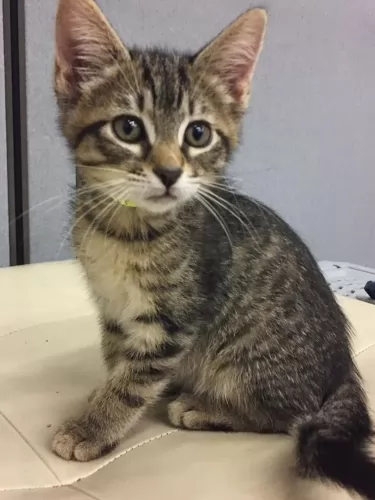 The Brazilian Shorthair is a purebred, medium to large sized cat that can weight between 5 nd 10kg. He is a thick-set cat that is muscular and strong and elegant to look at. The short coat comes in a variety of colors and patterns such as grey, black, orange, white and tan. The coat doesn’t require much grooming, but it is always beneficial to your cat to gently brush him to remove any excess hair there is. This cat has got such beautiful expressive eyes that you feel as if he wants to communicate with you sized cat
The Brazilian Shorthair is a purebred, medium to large sized cat that can weight between 5 nd 10kg. He is a thick-set cat that is muscular and strong and elegant to look at. The short coat comes in a variety of colors and patterns such as grey, black, orange, white and tan. The coat doesn’t require much grooming, but it is always beneficial to your cat to gently brush him to remove any excess hair there is. This cat has got such beautiful expressive eyes that you feel as if he wants to communicate with you sized cat
This is an adaptable cat that is able to adjust to the lifestyle you provide him with. He is an outgoing, intelligent, and inquisitive cat and enjoys the company of his human family, whether that includes children and other pets.
He gives a lot and expects lots of attention back from his humans. He is an inquisitive cat and loves to be going on his own adventures exploring.
He loves life and won’t enjoy a lifestyle where he is expected to lie around most of the day. He is intelligent and can learn tricks, and even though he is an elegant looking cat, he likes being active, spending time outdoors, and putting his hunting skills to the test.
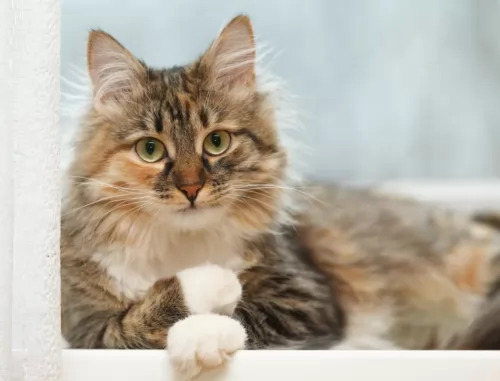 These Domestic long-haired cats are hugely popular in the United States. They can be of any color and the coat can have different patterns too, including bi-color, tortoiseshell and tabby.
These Domestic long-haired cats are hugely popular in the United States. They can be of any color and the coat can have different patterns too, including bi-color, tortoiseshell and tabby.
With his muscled, athletic body he can weigh between 3 and 6kg. He can have a variety of eye colors, ear sizes, and shapes Essentially, their size and shape is influenced by the breed that dominates.
These are just your regular, balanced cats and they make splendid pets for first-time cat owners, single pet owners, those with kids in the home and seniors. You can’t really tell how their personality will be and some will be more quiet than others and some more loving than others too. A lot depends on how you raise- and socialize your cat.
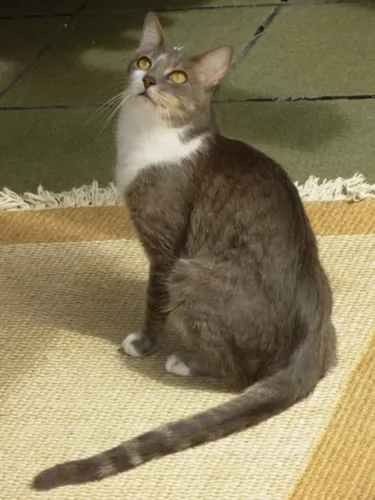 The Brazilian Shorthair makes a great choice for a loyal feline companion and he is a good looking cat too. They love human contact and love spending time with their human family, getting on well with the children in the home as well as other pets.
The Brazilian Shorthair makes a great choice for a loyal feline companion and he is a good looking cat too. They love human contact and love spending time with their human family, getting on well with the children in the home as well as other pets.
They don’t shed a lot either and therefore require little grooming. They’re adaptable pets too and become used to their different environments, loving to explore new places and even meeting new people.
They’re intelligent and can learn a few tricks that you’d normally teach a dog. As an intelligent cat, it loves to be challenged.
With so much going for him, no wonder the friendly, adaptable Brazilian Shorthair cat is such a popular breed as a domesticated house cat.
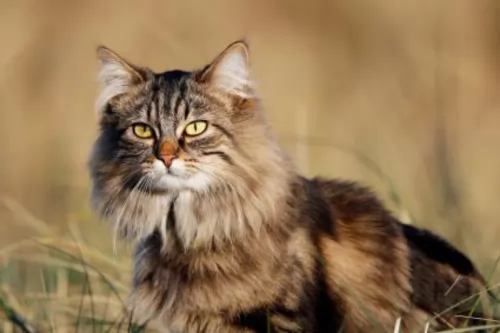 Domestic Longhairs are such wonderful cats and slot into a host of different lifestyles.
Domestic Longhairs are such wonderful cats and slot into a host of different lifestyles.
They are generally content cats with the different lifestyles they find themselves in. Some are smart, some playful, some quiet and some naughty, some are very vocal and some are content to be lap cats.
They're all different but they all have needs and concerns – to be part of a loving human family and to be treated with love, care and respect for the companionship they offer.
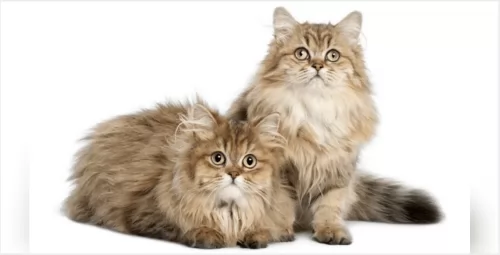 It is their mixed breeding that ensures that the Domestic Longhaired cat doesn’t have any health issues. Like any cat, things such as arthritis, cancer, diabetes and kidney disease can plague your cat.
It is their mixed breeding that ensures that the Domestic Longhaired cat doesn’t have any health issues. Like any cat, things such as arthritis, cancer, diabetes and kidney disease can plague your cat.
A good diet, exercise, lots of love and care can all help to ensure your kitty kat doesn’t succumb to anything that your vet can’t handle.
As soon as your cat shows any sign of illness, get him to the vet. If you look after your cat well, he can avoid a lot of vet visits and can reach 15 to 20 years of age.
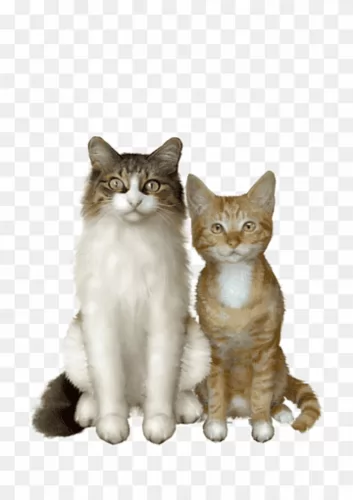 The Brazilian Shorthair has a short coat and won’t require too much grooming, although a gentle brush once a week is enjoyable. It becomes a bonding time with his owner and it keeps the coat free from dust and loose hairs.
The Brazilian Shorthair has a short coat and won’t require too much grooming, although a gentle brush once a week is enjoyable. It becomes a bonding time with his owner and it keeps the coat free from dust and loose hairs.
Check inside your cat’s mouth and make sure that all his pearly whites are just that. Sometimes a rotten tooth that he can’t tell you about can be a tremendous course of discomfort and pain. Also, check inside the ears for dirt and infection.
You can learn to clean the inside of the ears yourself but if you don’t want to do it, your vet or pet groomer can do these things for you – clip the nails of your pet, check the teeth for dental disease and check inside the ears.
Cats are carnivores, so they require animal protein for good health. Wet or dry commercial manufactured cat foods are super convenient and the best ones are excellent for your pet.
If you feel clueless about what to feed your cat, speak to your veterinarian who will guide you on the right food to give your pet. Certainly, your cat will need meat to get the nutrients he so badly needs.
The amount of food your cat needs to eat each day will depend on his age, weight, and activity levels. You want to get the correct amount of food right as obesity is a common health issue with cats and can contribute to a shorter life span. Always make sure your cat has access to fresh, cool drinking water.
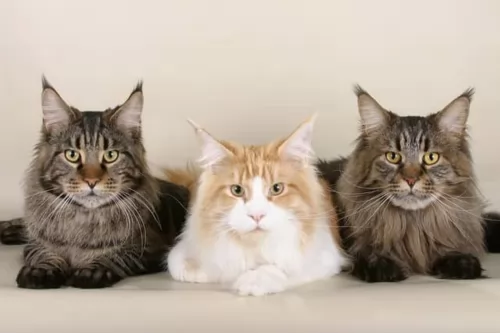 The hair of the Domestic Longhair will need to be tackled and you will need a firm brush to gently brush your cat once a week. This ensures the hair remains silky and tangle-free.
The hair of the Domestic Longhair will need to be tackled and you will need a firm brush to gently brush your cat once a week. This ensures the hair remains silky and tangle-free.
Remember, there are always professional cat groomers who specialize in grooming cats and ensuring their teeth, inside of ears, their nails and their fur is in tip-top condition.
Keeping your cat healthy is always going to require a trip to the vet. Your Domestic Longhair is going to require certain vaccines and deworming to ensure he remains free of deadly cat diseases. Also, if your cat is acting in a lethargic, ‘sick’ way, it could well be a sign that he is ill and a trip to the vet will be imperative as the condition could become worse.
To ensure your cat has the best chance at health, make sure you feed him well. Gut health is absolutely imperative and feeding your cat too many carbs will give him plenty of digestive problems.
A cat is a carnivore – a meat eater – and therefore his food needs to be meat. A kitten will require 4 small meals a day and an adult cat – over the age of 1 year – will require 2 meals a day. Any questions you have about feeding your cat can be answered by your local veterinarian.
Speak to your vet about spaying or neutering your Domestic Longhaired Cat as this will prevent unwanted kittens, particularly if your cat is allowed outdoors and wanders off.
Also, neutering and spaying have a host of health benefits for your cat and it also improves their personality.